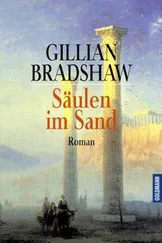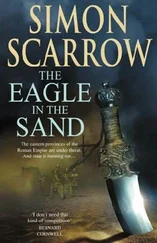Gillian Bradshaw - The Sand-Reckoner
Здесь есть возможность читать онлайн «Gillian Bradshaw - The Sand-Reckoner» весь текст электронной книги совершенно бесплатно (целиком полную версию без сокращений). В некоторых случаях можно слушать аудио, скачать через торрент в формате fb2 и присутствует краткое содержание. Жанр: Исторические приключения, на английском языке. Описание произведения, (предисловие) а так же отзывы посетителей доступны на портале библиотеки ЛибКат.
- Название:The Sand-Reckoner
- Автор:
- Жанр:
- Год:неизвестен
- ISBN:нет данных
- Рейтинг книги:3 / 5. Голосов: 1
-
Избранное:Добавить в избранное
- Отзывы:
-
Ваша оценка:
- 60
- 1
- 2
- 3
- 4
- 5
The Sand-Reckoner: краткое содержание, описание и аннотация
Предлагаем к чтению аннотацию, описание, краткое содержание или предисловие (зависит от того, что написал сам автор книги «The Sand-Reckoner»). Если вы не нашли необходимую информацию о книге — напишите в комментариях, мы постараемся отыскать её.
The Sand-Reckoner — читать онлайн бесплатно полную книгу (весь текст) целиком
Ниже представлен текст книги, разбитый по страницам. Система сохранения места последней прочитанной страницы, позволяет с удобством читать онлайн бесплатно книгу «The Sand-Reckoner», без необходимости каждый раз заново искать на чём Вы остановились. Поставьте закладку, и сможете в любой момент перейти на страницу, на которой закончили чтение.
Интервал:
Закладка:
The door to his room opened, and Philyra looked around it. She saw that he was awake, and came in.
Philyra was almost seven years younger than her brother, but tended to behave as though she were seven years older. She was a confident, outspoken, no-nonsense sort of girl; she'd been popular at her school and was well thought of in the neighborhood. She was very fond of her brother, but found him hopelessly vague and dreamy, much in need of firm management. She now advanced on him purposefully with a length of yellow cloth folded over her arm- towel or blanket or clothes, he wasn't sure. He sat up in bed, drawing up his long legs to make space for her, and she sat down and regarded him critically. He became uncomfortably aware that he was naked under the sheet, that his bare skin was blotched with fleabites, that his jaw and neck were scruffy with unshaved beard and his hair was dull with dirt. In daylight, too, he could see more clearly how she'd changed since he saw her last, how her body had filled out and rounded. Here in the house she was wearing only a light linen tunic, and it clung to her breasts revealingly. He felt abruptly embarrassed in front of her.
"When did you last have a bath?" asked Philyra, wrinkling her nose.
"You can't bathe on ships," he replied defensively.
Philyra sighed. "Well, you'll have to go to the bathhouse in the New Town as soon as you've had breakfast. You look perfectly disreputable! Do you have any clean clothes?"
He cleared his throat unhappily and didn't answer. "I didn't realize Papa was so ill," he said instead. "How long…"
"Since October," she said coolly. "He wrote to you then, but I guess you didn't get the letter until after the winter."
Ships did not sail on the Mediterranean between October and April; even if Archimedes had received his father's letter in late autumn, there would have been no way for him to come home until the sea-lanes opened again. But the thought of Phidias lying ill all winter while Archimedes enjoyed himself in Alexandria appalled him.
"I didn't get it until the end of April," he said miserably. "And even then I thought I had time to tie up all my business in Alexandria. All he said in it was 'A war's started and I'm not well.' I thought it just meant he wanted me home to help teach his students until he was better."
"He thought he would recover," said Philyra, and suddenly her eyes filled with tears. "He had a fever with jaundice, but Mama had it too, and she got better. We thought he was getting better, too. Only he wasn't, and this spring…"
Archimedes reached out and touched her shoulder, and she lost her no-nonsense composure, dropped her bundle, flung herself into his arms, and wept. "It's been horrible!" she cried passionately. "He gets worse and worse, and there's nothing we can do!"
"I'm sorry," he said helplessly. "I wish I'd been here."
"He wanted you," sobbed Philyra. "He kept sending Chrestos down to the harbor to see if there were any ships from Alexandria, and sometimes there would be, but you were never on them. And sometimes he'd say you must be dead, that your ship had sunk or that you'd died in Alexandria, and he'd weep for you and tell us all to go into mourning. That was the worst of all. Why didn't you come back last year?"
"I'm sorry!" he said again wretchedly, tears rising to his own eyes. "Philyra, I swear I would have if I'd known."
"I know," she said, swallowing her sobs. "I know." She patted him on the back, as though he were the one who had broken down, then drew away, wiping her eyes. Nothing could be done about death, and she was determined to bear the grief with all the dignity she could command. She picked up her bundle again and spread it out on the bed: it turned out to be a new cloak, woven of fine yellow wool, and a linen tunic with a yellow spiral pattern down the sides. "I made these for you last year," said Philyra. "You don't have any clean clothes, do you?"
"I don't think so," he admitted, tracing the pattern with one slow finger. It was a series of double spirals, all centered on a line from shoulder to knee; from each central point a line circled outward one turn, then twisted about and ran into the center of the succeeding spiral. An interesting pattern. A line constructed tangent to both spiral A and spiral B would…
Philyra firmly removed his hand from the pattern; he looked up and blinked at her in surprise. "It's to wear," she told him. "Not to do geometry on."
"Oh," he said. "Yes." After a moment, he remembered that the clothes were a present and added, "Thank you. I like them very much."
She shook her head in mock despair. "Ai, Medion! You haven't changed at all!"
He wasn't sure what to make of that, and she smiled again at his bewilderment and brushed back a stray lock of his dirty hair. "Now," she went on, businesslike and hopeful, "do you have any money? We've been running out. We had to sell some blankets and pots to pay the doctor."
Archimedes shrugged. Most of the water-snail's earnings had vanished in Alexandria. But there was a little left, and a little more from the odds and ends he'd sold on leaving the city. "I have a bit," he said. "About a hundred drachmae, I think- Marcus knows exactly."
"A hundred drachmae!" she exclaimed eagerly. "That's good! I was afraid we'd have to go around to Papa's old pupils at once, and beg them to take up mathematics again. But a hundred drachmae will buy us a couple of months' grace."
Archimedes cleared his throat and shifted nervously. "I'm not going to teach," he declared.
She stared at him in exasperation. "Medion, you can't make a living from geometry!"
"I know that!" he protested. "I'm going to get a job as an army engineer." He launched into the arguments he had carefully prepared beforehand. "With a war on, the city must need catapults, and the tyrant must be willing to pay for them. There's more money in machines than in teaching. And I'm good with machines, you know I am. That irrigation device I built last summer earned more in two months than Papa ever earned in a year. Besides, shouldn't I help defend the city if I can? I'm going to see somebody about it this evening."
At this she smiled, encouragingly rather than with conviction. She had heard about the water-snail from his letters home, but she rather doubted that it was as successful as he claimed, and as for catapultswell, the king already had engineers who could build them, so why would he want somebody new and completely untried? Even if he did, it seemed unlikely that anyone would get rich from it. Her brother had made lots of machines as they grew up together, and many of them hadn't worked at all. Machine-making didn't seem to her as reliable a source of income as teaching mathematics. Still, she liked his machines. As a small girl she had sat quietly watching as he built them, and listened to his explanations with solemn attention. As far as she was concerned, her brother's constructions were the most wonderful of toys, whether they worked or not. She would be very pleased if he could make a living from them. It was worth a try, anyway- and the household now had a hundred drachmae and a couple of months before the money ran out.
Archimedes saw that she had accepted his plan, and felt a twinge of dread, as though another gate had closed in the walls which surrounded him. He had decided in a rare moment of practical planning that there were three things he was good at- pure mathematics, mechanics, and playing the flute. To earn a living he must put one or another of those skills to use. Music was something personal, something he did for himself and his friends; it seemed profane to play to order. As for pure mathematics, as Philyra had pointed out, he couldn't make a living simply from doing geometry, and as for teaching it, he'd occasionally been called in to help his father in the past, and he was uncomfortably aware that he was bad at it. The students never understood things which seemed to him glaringly obvious, and his impatient explanations only confused them. So machine-making it would have to be.
Читать дальшеИнтервал:
Закладка:
Похожие книги на «The Sand-Reckoner»
Представляем Вашему вниманию похожие книги на «The Sand-Reckoner» списком для выбора. Мы отобрали схожую по названию и смыслу литературу в надежде предоставить читателям больше вариантов отыскать новые, интересные, ещё непрочитанные произведения.
Обсуждение, отзывы о книге «The Sand-Reckoner» и просто собственные мнения читателей. Оставьте ваши комментарии, напишите, что Вы думаете о произведении, его смысле или главных героях. Укажите что конкретно понравилось, а что нет, и почему Вы так считаете.












